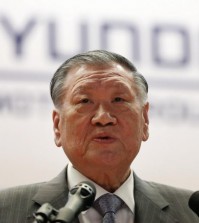- California Assembly OKs highest minimum wage in nation
- S. Korea unveils first graphic cigarette warnings
- US joins with South Korea, Japan in bid to deter North Korea
- LPGA golfer Chun In-gee finally back in action
- S. Korea won’t be top seed in final World Cup qualification round
- US men’s soccer misses 2nd straight Olympics
- US back on track in qualifying with 4-0 win over Guatemala
- High-intensity workout injuries spawn cottage industry
- CDC expands range of Zika mosquitoes into parts of Northeast
- Who knew? ‘The Walking Dead’ is helping families connect
New TV CEOs in Korea face independence questions
By Kim Tong-hyung
Journalists are expressing increasing frustration over the continuing Korean practice of parachuting presidential cronies into CEO spots at television companies, which they believe have irrevocably damaged the credibility of networks, such as MBC.
The recent appointment of Ahn Gwang-han as the new MBC chief has touched off fierce criticism from the company’s reporters’ union as he had been the right-hand man of his controversial predecessor, Kim Jae-chul.
Kim was accused of censoring reports and abolishing investigative news programs to maintain a close relationship with the government of former President Lee Myung-bak, who shared the same party with current President Park Geun-hye. Kim’s conflict with the news staff triggered an all-out reporters’ strike in 2012.
Ahn further infuriated MBC reporters by naming Kwon Jae-hong as the company’s new vice president and Lee Jin-suk as chief news editor. Kwon, a former news host, served as chief news editor under Kim, who picked Lee Jin-suk, a former reporter, as his spokeswoman.
Kwon and Lee Jin-suk were both vocal critics of the reporters’ strike. Kwon in particular became a target of ridicule when he went on air to say that he had been assaulted by his striking colleagues, a claim he later admitted was untrue.
The editorial independence of broadcasters continues to be a subject of controversy whenever a new government is elected. However, the debate has never been as deafening as during the past several years under the conservative administrations of presidents Lee and Park with journalists complaining that the government interference has become more profound and direct.
The government retains the right to name the president of state-run network KBS and essentially holds the same power over MBC. Although MBC is set as a commercial network, it is 70-percent owned by the Foundation for Broadcast Culture, of which the Korea Communications Commission, the country’s broadcasting regulator, holds the right to name all nine of its board members.
”In naming Ahn, the Park government is in danger of repeating the same mistakes as the Lee government. If Ahn tries to suppress and censor news reporting in favor of the government like Kim did, we will once again fight this with a strike,’’ the MBC reporters’ union said in a statement.
Jeong Seung-geun, who began his term as the new CEO of the state-run English-language network Arirang Television earlier this week, is also a controversial hire. The 59-year-old, who left SBS television in 2012 to pursue a career in politics, served as a spokesman for Park’s camp in that year’s presidential election.
Before landing the job at Arirang TV, Jeong has been heading the Paju branch of President Park’s Saenuri Party. Jeong replaced Sohn Ji-ae, the former CNN journalist, who resigned from the post citing unspecified personal reasons last month.
The culture ministry picked Jeong out of three candidates, who also included former Government Information Agency official Jang Se-chang and former Korea Creative Content Agency head Jeong Dong-cheon.
“Jeong was picked through due process, so we will be closely watching how he does his job,’’ Lee Eun-seo, head of the reporters’ union at Arirang TV, told Media Today, a peer-review journal of journalists.
“There better not be any incidences where Arirang TV suffers because (of the CEO’s) attempts to be close with the government.”

















